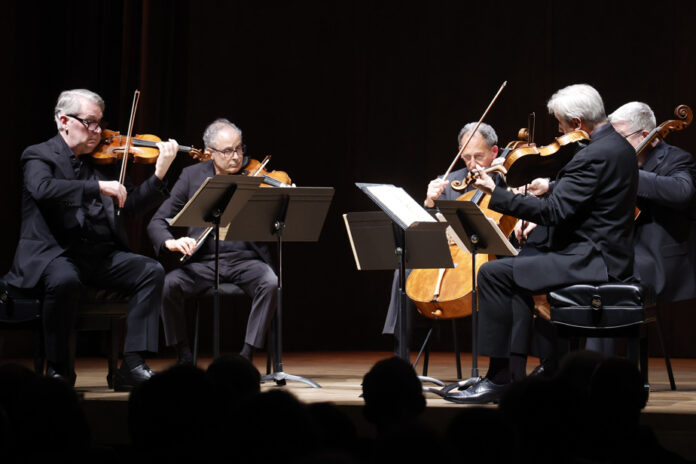The star quartet of this year’s Montreal Chamber Music Festival takes its name from the American philosopher Ralph Waldo Emerson, a great figure of transcendentalism. His musicians have put his lesson to good use by making their concert on Tuesday evening a real bridge to another world.
The Emerson Quartet was at its second and penultimate farewell concert in Quebec. The first took place at the Club musical de Québec in October 2022, and the last will be held at Domaine Forget in Charlevoix on July 14.
In the metropolis, the quartet members were accompanied by two guests: cellist – and festival founder and director – Denis Brott in Schubert’s String Quintet in C major, D. 956, and young Albertan prodigy Jan Lisiecki in Piano Quintet No. 2 in A major, Op. 81, by Dvořák.
Despite the busy classical calendar in Montreal (notably the operetta L’adorable Belboul by Massenet at the same time at the Festival Classica), Bourgie Hall was full to hear one last time these giants of chamber music, who will play together for the last time. in New York in October after almost 50 years of existence. An exceptionally attentive audience who, rare thing now, did not applaud between movements.
You had to be there to see the exceptionally long and sustained look that the musicians gave each other before embarking on Schubert’s quintet, the type of look you do before announcing very good news. The first chord, of a piano of unparalleled concentration, was to match. The rest too.
There is a recording of the work made 30 years ago at Deutsche Grammophon by the Emersons with Rostropovitch, sorry. A fine achievement, but marked by a sonic hedonism somewhat curbing the naturalness of the discourse.
Everything has a feline suppleness, especially the magnificent second theme of the Schubert first movement, which is just restrained enough. In the following movement, on the contrary, we taste the electric intensity created by the repeated quavers in the violin II and the viola.
We are also far from the “Emerson sound” cultivated on disc. Firstly because of the acoustics, dried up by the record number of spectators, especially those on the balcony, where the wooden benches usually add a certain reverberation.
But also because of the usual conditions of the concert, in particular fatigue. The intonation at the end of the evening, but also of the first part, suffers, and this is completely normal.
There are also the individual performances of the musicians. “Baby” of the quartet (he replaced David Finckel 10 years ago), cellist Paul Watkins charms with his generous sound, especially in the first movement of Dvořák’s quintet, but also with his commitment. The violist Lawrence Dutton is not far from perfection also in his solo interventions in the following movement.
But Philip Setzer, who occupies the position of first violin for both works, disappoints more with a sound that is a little more precarious. We have confirmation of this when he changes places, for the recall from the Cypresses of Dvořák, with his colleague Eugene Drucker, with a more assured game.
It is obviously more difficult to judge what Brott did, hardly exposed in Schubert, than Lisiecki’s contribution in Dvořák. The Little Prince of the piano, who is constantly on the lookout for what the Emersons are doing, is moving with the poetry of his playing, on a Steinway whose sound seemed unusually hushed to us.















